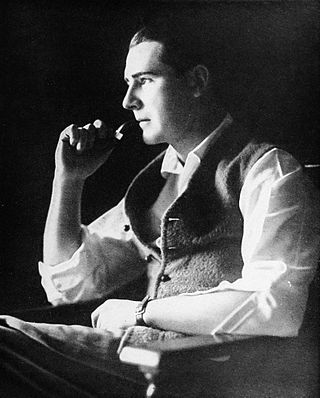
Rex Ingram was an Irish film director, producer, writer, and actor. Director Erich von Stroheim once called him "the world's greatest director".

Father of the Bride is a 1950 American comedy film about a man trying to cope with preparations for his daughter's wedding starring Spencer Tracy, Joan Bennett, and Elizabeth Taylor. Directed by Vincente Minnelli, it was adapted by Frances Goodrich and Albert Hackett from the 1949 novel by Edward Streeter. Father of the Bride was nominated for Academy Awards for Best Picture, Best Writing, Screenplay, and Best Actor in a Leading Role.
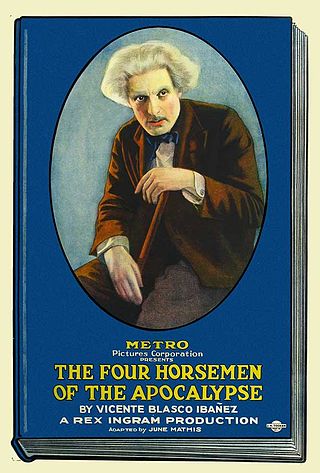
The Four Horsemen of the Apocalypse is a 1921 American silent epic war film produced by Metro Pictures Corporation and directed by Rex Ingram. Based on the 1916 Spanish novel The Four Horsemen of the Apocalypse, by Vicente Blasco Ibáñez, it was adapted for the screen by June Mathis. The film stars Pomeroy Cannon, Josef Swickard, Bridgetta Clark, Rudolph Valentino, Wallace Beery, and Alice Terry.
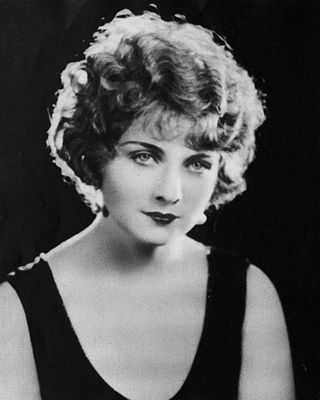
Alice Frances Taaffe, known professionally as Alice Terry, was an American film actress and director. She began her career during the silent film era, appearing in thirty-nine films between 1916 and 1933. While Terry's trademark look was her blonde hair, she was actually a brunette, and put on her first blonde wig in Hearts Are Trumps (1920) to look different from Francelia Billington, the other actress in the film. Terry played several different characters in the 1916 anti-war film Civilization, co-directed by Thomas H. Ince and Reginald Barker. Alice wore the blonde wig again in her most acclaimed role as "Marguerite" in film The Four Horsemen of the Apocalypse (1921), and kept the wig for any future roles. In 1925 her husband Rex Ingram co-directed Ben-Hur, filming parts of it in Italy. The two decided to move to the French Riviera, where they set up a small studio in Nice and made several films on location in North Africa, Spain, and Italy for MGM and others. In 1933, Terry made her last film appearance in Baroud, which she also co-directed with her husband.
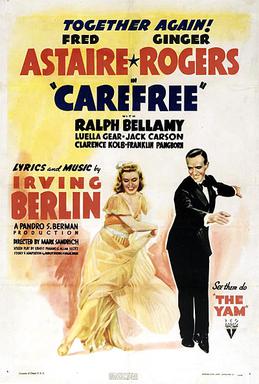
Carefree is a 1938 American musical comedy film directed by Mark Sandrich and starring Fred Astaire, Ginger Rogers and Ralph Bellamy. With a plot similar to screwball comedies of the period, Carefree is the shortest of the Astaire-Rogers films, featuring only four musical numbers. Carefree is often remembered as the film in which Astaire and Rogers shared a long on-screen kiss at the conclusion of their dance to "I Used to Be Color Blind," all previous kisses having been either quick pecks or simply implied.
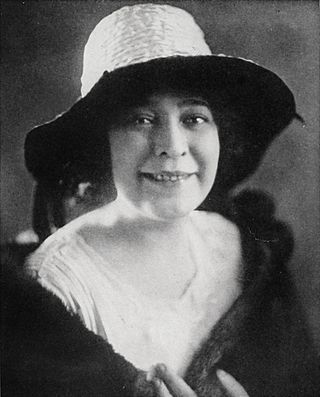
June Mathis was an American screenwriter. Mathis was the first female executive for Metro/MGM and at only 35, she was the highest paid executive in Hollywood. In 1926 she was voted the third most influential woman in Hollywood, behind Mary Pickford and Norma Talmadge. Mathis is best remembered for discovering Rudolph Valentino and writing such films as The Four Horsemen of the Apocalypse (1921), and Blood and Sand (1922).

Francelia Billington was an early American silent-screen actress, and an accomplished camera operator.
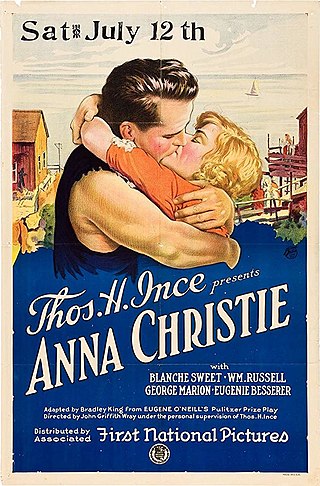
Anna Christie is a 1923 American silent drama film based on the 1921 play by Eugene O'Neill and starring Blanche Sweet and William Russell.

The Gay Deceiver is a 1926 American silent romantic drama film directed by John M. Stahl. The film stars Lew Cody and Carmel Myers.

Trifling Women is a 1922 American silent romantic drama film directed by Rex Ingram. It is credited with boosting the careers of its leads, Barbara La Marr and Ramon Novarro. It has been described as Ingram's most personal film.
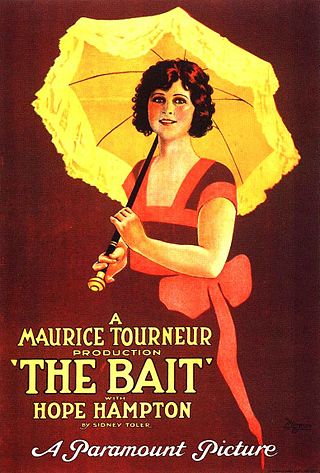
The Bait is a 1921 American silent crime drama film produced by and starring Hope Hampton, directed by Maurice Tourneur, and distributed by Paramount Pictures. John Gilbert, then working for Tourneur, wrote the scenario based on the stage play The Tiger Lady by Sidney Toler. Filmed in 1920, the picture was released a day after New Year's 1921. The Bait is now considered to be a lost film.
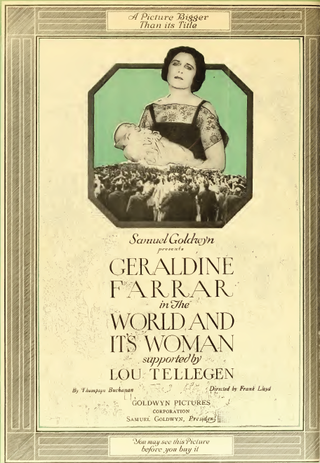
The World and Its Woman is a 1919 American silent drama film produced and distributed by Goldwyn Pictures and directed by Frank Lloyd. Opera singer Geraldine Farrar and her husband Lou Tellegen star.

Lord and Lady Algy is a lost 1919 American silent comedy film directed by Harry Beaumont and starring Tom Moore, Naomi Childers, and Frank Leigh. It is based on a play of the same name by R.C. Carton.

The White Sin is a 1924 silent romantic drama film directed by William A. Seiter and starring Madge Bellamy and John Bowers. It was distributed by Film Booking Offices of America (FBO).
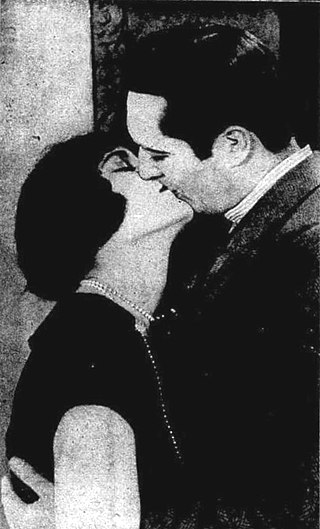
The Kiss Barrier is a lost 1925 American silent drama film directed by Roy William Neill and written by Eugenie Magnus Ingleton. The film stars Edmund Lowe, Claire Adams, Diana Miller, Marion Harlan, Thomas R. Mills, and Charles Clary. The film was released on May 31, 1925, by Fox Film Corporation.

What a Wife Learned is a 1923 American drama film directed by John Griffith Wray and starring John Bowers, Milton Sills, Marguerite De La Motte, Evelyn McCoy, Harry Todd, and Aggie Herring. Written by Bradley King, the film was released on January 28, 1923, by Associated First National Pictures.

The Marriage Whirl is a 1925 American silent drama film directed by Alfred Santell and written by Bradley King. It is based on the 1922 play The National Anthem by J. Hartley Manners. The film stars Corinne Griffith, Kenneth Harlan, Harrison Ford, E. J. Ratcliffe, Charles Willis Lane, Edgar Norton, and Nita Naldi. The film was released on July 19, 1925, by First National Pictures.

At the Stroke of the Angelus is a silent short film starring Charles Clary and Francelia Billington. Billington portrays an American girl kidnapped in early childhood and brought up as a Mexican thief and street dancer. She falls in love with a wealthy American, who they come to believe may be her uncle.

The Lord Loves the Irish is a 1919 American silent comedy film directed by Ernest C. Warde and starring J. Warren Kerrigan, Aggie Herring and James O. Barrows.
Blazing Arrows is a 1922 American silent Western film directed by Henry McCarty and starring Lester Cuneo, Francelia Billington and Clark Comstock.



















